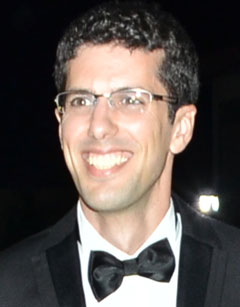Young Scholar Profile: Batuhan Osmanoğlu
 In every issue of The Bridge, we highlight a young scholar profile from our diaspora. These accomplished and early career individuals demonstrate the potential of next generation Turkish-American scientists and scholars. The young scholar in this issue is Batuhan Osmanoğlu, Ph.D, remote sensing scientist who is studying our changing planet.
In every issue of The Bridge, we highlight a young scholar profile from our diaspora. These accomplished and early career individuals demonstrate the potential of next generation Turkish-American scientists and scholars. The young scholar in this issue is Batuhan Osmanoğlu, Ph.D, remote sensing scientist who is studying our changing planet.
The Bridge : Would you please tell us about yourself and your journey that led you to become a scientist.
Batuhan Osmanoğlu: I have always been fascinated by how things worked, especially electronics. During my youth, a number of technologies were developing, such as personal computers, internet and cell phones. When it was time to make my choice for my college major, I knew it was going to be something related to electronics. I ended up going to Istanbul Technical University (ITU) and graduated as a Telecommunications Engineer. I spent my junior year at the University of Miami, Florida (UM) as an exchange student. It was a fortunate coincidence that both ITU and UM operate ground receiving stations. I interned at both receiving stations and became involved in radar remote sensing. After graduating from ITU, I went back to UM for a Ph.D. in Marine Geology and Geography. The program at UM started my transition from an engineer to a scientist.
T. B. : Tell us about your research and how it is related to everyday life or other fields.
B. O : I work on radar imagery, which looks like black-and-white photos taken from the air. Radar systems operate on microwave frequencies, similar to the microwave oven you may have at home or a cell phone in your pocket. Microwaves can penetrate clouds and imaging can be done at night. Another important feature of radar imagery is that it can be used to measure distances very accurately. Using this feature, I work on generating topographic maps, measuring the very small distances involved in determining ground subsidence rates or glacier speeds. Currently I am working on an airborne radar imaging system and creating forest height maps as a contractor at NASA Goddard Space Flight Center in Greenbelt, MD.
T. B. : What do you consider important to your success ? Tell us about any skills or habits that you think helped you to become a successful scientist at such a young age.
B. O. : My best guess is hard work and persistence. Growing up I realized that there were always going to be smarter kids at school, but that I could also achieve at the highest levels by putting in however much effort it took. Especially during graduate school I witnessed how persistence can be more predictive of success than sheer intelligence, as I saw many smart people leaving their graduate programs.
T. B. : What are your immediate and long-term goals for the future?
B. O. : My immediate goals are mostly family-oriented, because we are expecting a baby boy any week now. I am sure he will bring a nice change to our lives even though it may be challenging to balance work and home life at first. My longer-term goals haven't changed since I finished my Ph.D.: I am working hard to be one of the best radar remote sensing scientists among my peers.
T. B. : What do you recommend to aspiring scientists, or to young Turkish scientists who are at the beginning of their careers?
B. O. : When I was in high school or even my first years at ITU, I wasn't thinking at all about going abroad to study or work. During my exchange year in Miami, I realized that the world is much bigger than Turkey and there are so many opportunities available if you are willing to expand your horizons. It is also very important to enjoy what you are working on, because the satisfaction you get from a scientific career is not monetary, it is getting to do what you love every day. Finally, once you are among your scientist peers it is important to collaborate more and compete less. In my experience, collaboration is a much more effective strategy for reaching your scientific goals than working on your own.
T. B. : Could you please tell us about your life outside of your work? Do you have hobbies? What are your favorite activities? If you recommend a book, what would that be and why?
B. O. : Outside work, I like traveling and spending time outdoors hiking. I also enjoy tinkering with things like computers and cars, though I must say, I know my way around a computer much better than I do a car. I would suggest Nobel Laureate Richard Feynman's book titled: "The Pleasure of Findings Things Out". It is a great read full of anecdotes (some quite funny) from Feynman's life, and I believe many scientists will be able to draw parallels between Feynman's experiences and their own.